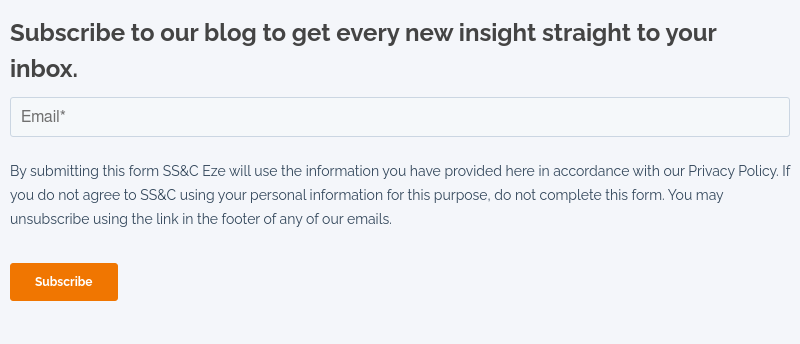Market changes put focus on operations. Will your hedge fund be ready?
As last year wound down, hedge fund managers had much to celebrate.
The Hedge Fund Research Institute (HFRI) reports that hedge fund performance surged at the end of the year, driven by a combination of a decline in inflation, falling bond yields, structural developments in cryptocurrency, improving M&A, and the general economic outlook for the year ahead.
As a result, the 2023 calendar year return for the HFRI Fund Weighted Composite Index (FWC) jumped an estimated 2.6 percent at year-end, contributing to a total increase of 7.5 percent.
While these numbers show positive momentum, HFRI notes that not all hedge funds participated in this success. There is a notable performance dispersion between those funds at the top and those at the bottom. For 2023, the top decile of FWC constituents gained 36.1 percent, while the bottom decile declined 15.1 percent, representing a top/bottom dispersion of 51.2 percent.
It’s always difficult to predict what lies ahead; after all, past performance is never an indication of future performance. But one thing is clear: anyone starting a hedge fund today will need to gain every operational advantage to keep their fund ahead in 2024.
In this blog post, I share insights gleaned from my 17 years of experience in financial technology. I’ll show you how, with the right plan, partnerships, and technology, you can start your firm on the right path and set up for long-term success.

1. Set Your Course – Start with a Detailed Plan
The first step in starting a hedge fund is to define what you want your firm to be today – and in the future.
Make a business plan outlining your investment strategy and the costs of running an efficient and institutionally sound operation.
At this point, you’ll also want to think about how you’ll market your fund. Create a pitch book highlighting your investment objectives, strategies, and who runs the show.
As you develop your marketing strategy, be certain to refer to the SEC Marketing Rule.
Announced at the end of 2020, the rule regulates investment advisers’ marketing communications and limits the performance information they can share. Late last year, the SEC fined nine firms a collective $850,000 for violating the policy, showing their commitment to enforcing the rule.
The final part of your plan will be to define what roles you want to hire in-house and what functions you can outsource. Keep in mind that as your fund grows, you may need to rethink what functions are outsourced versus what you perform in-house.
Getting up and running will likely take longer than you think. On average, hiring the right personnel and setting up all the partnerships you’ll need, including legal entities, auditors, and prime brokers, can take six to nine months. But having a plan and your end vision in mind will help ensure things stay on track.
2. Meet Investor Operational Demands with Help from the Experts
Allocators' most significant barriers to hedge fund investments are now due diligence, poor administration standards, and lack of transparency. Add to this the challenge of navigating evolving regulatory requirements and settlement changes, and managing your firm's operations becomes increasingly complicated.
Luckily, help from the right experts can make managing your fund operations successful regardless of complexity.
When choosing these experts, research and hire the best providers you can find. Look for vendors and professionals with long track records of success in the industry who can work with you beyond launch as a long-term partner.
Once in place, put this team of experts to work. Before you enter due diligence, most investors will expect to see:
- Legal and tax infrastructure completed for jurisdictions in which you will operate
- Connections to prime brokers who can provide capital introductions essential to fundraising
- A technology operations system handling trading, accounting, reconciliations, etc.
- Proper certification for all vendors, demonstrating that they uphold rigorous, globally recognized standards
Learn more about the partners you'll need to set up your operation. Ebook: Starting A Hedge Fund - How to Choose Your Vendors
3. Beyond Due Diligence: Choose Partners for Long-Term Growth
Your goal in starting a hedge fund is to achieve long-term growth. Doing so requires working with trusted partners who will continue to support you on your path long after launch.
So, how do you know if a provider is a partner for growth? This type of provider will have specific distinct characteristics.
Service is one of the most important characteristics to look for in a vendor. From onboarding and implementation to day-to-day support for your front- to back-office, you need to know your vendor can provide fast and personalized service from day one. Also, be sure your service partnership can expand to accommodate your needs as your business grows.
See why quality vendor service is critical to a fund’s success.
In addition to scalable support, any technology provider should offer flexible and configurable solutions that will not only meet your current needs but expand and grow as your needs evolve.
At a minimum, these solutions should be built using an elastic infrastructure and employ APIs that empower you to extend the value of your platform investment through integrations with current and future tools.
To scale even more seamlessly, choose a vendor with an app store or marketplace of plug-and-play applications. This type of solution lets you expand your investment ecosystem quickly when the time is right, without the cost and hassle of vetting and onboarding additional vendors.
“Start-up funds tend to run lean, so it is very important to find partners that you trust and will give you the attention you need.”
- JOSEPH WEISS, CO-FOUNDER & SENIOR ANALYST AT NATARE CAPITAL MANAGEMENT
4. Ask These Critical Questions when Selecting a Hedge Fund Technology Partner
Often, hedge fund founders don't make necessary considerations or factor in growth when choosing a technology operations system provider. Instead, these firms simply settle for the vendor with the lowest proposal price or that meets only their day-one requirements.
To avoid buyer's remorse, compare the goals of your fund with the technology the provider is offering.
Start by looking at your business plan and answering the following:
- What's my ultimate size goal? What technology will I need to accommodate a hedge fund of this size?
- How big do I envision my firm getting? How much mobility should my technology system have across offices and jurisdictions?
- Do I want to go after larger investors, and will I adjust my fee structure to accommodate them?
- What strategies do I want to run, and how much flexibility do I need to be able to introduce new asset classes?
Next, evaluate whether your technology partner can help you achieve your goals. Asking these questions can help you make that assessment:
- Are you a partner I can trust? What is your track record in the industry, and how do I know you take technological and operational risk seriously?
- What is the size of your service and support organization? Do they have expertise in specific areas of my business? Can I always get someone on the phone if I have an issue? What is your experience helping firms like mine grow?
- Are you capable of supporting the asset classes, jurisdictions, and strategies I have defined for my fund today, and any ideas I have for the future?
If the vendor can't answer these questions satisfactorily and grow with you to accommodate your desired path, the total cost of ownership (TCO) is far greater than the low up-front cost.
Learn how to calculate your technology TCO and implement cost-saving strategies in this guide.
Additionally, inquire about your vendor's system delivery options. A cloud-hosted system with a scalable, elastic infrastructure is best. Flexible, modern cloud technology allows you to access your systems and deliver returns regardless of location or market volatility. Cloud-hosted systems also provide critical connections in today's hybrid work environment.
Choosing a technology provider that offers the scalability and adaptability to handle your workflows of today – and the future – sets you up for operational success and saves you the cost and hassle of switching providers down the line.
5. Don’t Wait – Get Ahead of the Competition
Hedge fund managers shouldn’t wait until after launching their funds to implement critical investment operations.
Making a plan, finding the right partners, and adopting scalable technology creates an institutionalized infrastructure that sets your hedge fund up for success.


